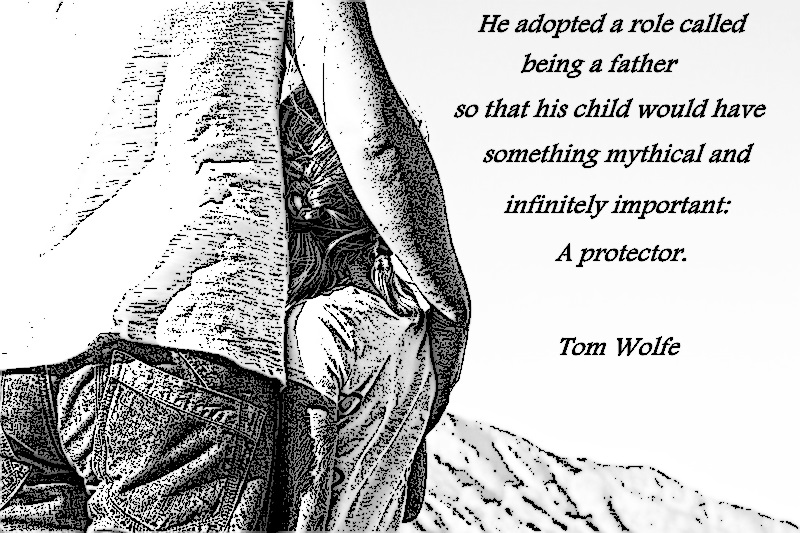
Sitcoms are not the ideal source of fatherly examples, but if you search for a list of the best TV dads, you’ll see a bunch of often goofy fathers who seem to screw up just as much as their kids. What you’ll also see, however, is that these dads (well, some of them at least) have managed to juggle two key parenting factors: Laying down the rules and setting healthy boundaries, balanced out with love, warmth, responsiveness, and wisdom (often resulting from their own crazy mistakes). Take Phil Dunphy from Modern Family, as an example. He’s my favorite TV dad of all time:
“I’ve always said that if my son thinks of me as one of his idiot friends, I’ve succeeded as a dad.”
“My kids are helpless, but maybe that’s okay, because years from now, when they have their own houses, they’ll call me on their hologram phones and say ‘help me Dad, you’re my only hope’, and I’ll be the happiest father in sector 7.”
And according to research we conducted at Queendom, this perfect balance of firmness and responsiveness is what good dads tend to have in common…and good dads often have great kids.
Analyzing data from 513 fathers who took the Parenting Style Test, we compared two distinct groups: Fathers with well-behaved children and fathers with ill-behaved kids. Here’s how these dads differed:
They’re loving, caring, dependable, and open-minded
- 95% of dads with well-behaved kids offer unconditional love to their children (compared to 42% of dads with ill-behaved kids).
- 75% of dads with well-behaved kids believe that children should get plenty of love and attention (compared to 39% of dads with ill-behaved kids).
- 95% of dads with well-behaved kids make themselves available when their children need help (compared to 45% of dads with ill-behaved kids).
- 93% of dads with well-behaved kids encourage open communication in their households (compared to 39% of dads with ill-behaved kids).
- 91% of dads with well-behaved kids nurture their child’s individuality and independence (compared to 48% of dads with ill-behaved kids).
- 79% of dads with well-behaved kids said that they trust their children to make the right choices in life (compared to 42% of dads with ill-behaved kids).

They have a clear set of rules
- 95% of dads with well-behaved kids establish boundaries but also grant reasonable amounts of freedom (compared to 61% of dads with ill-behaved kids).
- 95% of dads with well-behaved kids believe that children need discipline (compared to 68% of dads with ill-behaved kids).
On the flip side…
- 55% of dads with ill-behaved kids expect their children to adopt their parent’s values and opinions without questioning them (compared to 20% of dads with well-behaved kids).
- 19% of dads with ill-behaved kids would rather give in to their kid’s demands and wishes than risk having their kids hate them (compared to 10% of dads with well-behaved kids).
They believe in team parenting
- 83% of dads with well-behaved kids believe that it’s important for parents to be on the same page when it comes to how they will raise their children (compared to 45% of dads with ill-behaved kids).
- 75% of dads with well-behaved kids discuss appropriate reprimands (e.g. grounding, taking away privileges) with their partner before administering them (compared to 29% of dads with ill-behaved kids).
They believe in good parenting, not perfect parenting
- Only 38% of dads with well-behaved kids would strictly monitor and control what their kids watch on TV, and how much TV they watch.
- 54% of dads with well-behaved kids said that they would be involved in every single one of their child’s activities.
- 23% of dads with well-behaved kids believe that babies should only be given organic food.
- 27% of dads with well-behaved kids believe that children should be sheltered (from injustice, bad behavior of others, etc.).

Food for thought…
Among the sample of dads with well-behaved kids:
- 93% had an authoritative parenting style
- 4% had a permissive style (no rules, lots of freedom and love)
- 3% had an authoritarian style (lots of rules; little love and warmth)
Among the sample of dads with mischievous kids:
- 39% had an authoritarian style (lots of rules; little love and warmth)
- 32% had an authoritative parenting style
- 19% had a negligent style (completely uninvolved in their child’s life; no rules or love)
- 10% had a permissive style (no rules, lots of freedom and love)
On TV, dads tend to fall under three categories…every other dad is just some variation of these.
- A goof who tries to be cool to make it seem like he relates to his kids
- A mercilessly taskmaster who pushes too hard and is emotionally distant
- A “deadbeat dad” who is completely uninvolved in his child’s life.
In real life, for many, many decades, it was believed that tough love was the ideal child-rearing approach. Fathers decided the rules, disciplined their children, and pushed the “as long as you’re under my roof” mentality. The problem is that tough love was ill-defined. It isn’t about riding your kid hard because you think it will make them more resilient and wiser. Tough love is about setting healthy boundaries and teaching life lessons, but also being supportive and being there when needed.
Authoritative dads don’t let kids off the hook when they mess up. They sit their kids down, make it clear why their behavior is wrong, ensure there are corrective actions, and then teach their child the right thing to do. It’s the “Kid, I love you, but until your grades improve, no video games” or the “Kid, you screwed up. Face the music and take responsibility for your mistakes. I will be there to support you, but I’m not covering for you” approach. These are dads who know how to perfectly meld firmness with responsiveness, and toughness with lovingness. And what happens is that their children grow up to be respectful of authority – neither rebels nor fearfully obedient. They grow up to be independent, well-adjusted, resilient, and ready to face the world without carrying a chip on the shoulders. Great dads, authoritative dads, make even greater kids.

Insightfully yours,
Queen D
